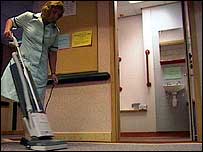
A couple of weeks ago the U. S. Senate voted down an increase in the national minimum wage again. Sixty votes were needed. The bill got only 52 "Yeas."
This particular bill would have seen the bottom rung on the pay ladder move up a couple of dollars from $5.15 to $7.25 an hour between now and January 1, 2009.
The minimum wage level has been stalled at the lower rate since 1997.
Since that time, the purchasing power of $5.15 an hour has declined by 20%. Adjusted for inflation the current minimum hourly wage is as low as it has been since 1955! Remember President Dwight D. Eisenhower? How about the Brooklyn Dodgers? If the wage is not raised by December 2, 2006, it will have been frozen longer than at any time since the inception of the national wage measure in 1938.
Hmmm.
Some members of our Congress are working as hard as they can to do two things: block any increase in the minimum wage and repeal the estate tax. Go figure!
Senator Hillary Clinton observed recently that since 1997, the Senate has raised its own pay by $31,600. Clinton's version of a minimum wage bill linked wages at the bottom to congressional pay increases. Going forward increases in
 minimum wage levels would be increased automatically by the same percentage as any increase in Congressional pay.
minimum wage levels would be increased automatically by the same percentage as any increase in Congressional pay.Fat chance!
The Economic Policy Institute reports that in 2005, the pay of top CEOs of major corporations is 821 times as much as the person earning minimum wage. The CEO earns more before the lunch break in one day than a minimum wage worker earns in an entire year.
Now add in rising utility costs, gasoline prices and health care issues and you have recipe for total disaster.
The entire picture is a national disgrace.
More tomorrow.
Great question, Josh.
ReplyDeleteLarry, what can we do? This is a disgrace and absolutely unfair.
Josh and Chris, write to your Senators (Cornyn and Hutchinson) and ask why they voted against the increase. Mount a campaign in your groups to get a call in and letter writing campaign going. Be sure and read tomorrow here, as I will answer some objections that you will face in supporting the increase that is needed.
ReplyDeleteInternet Esquire, why on earth would it need to be an either/or proposition with EIC and Minimum Wage? I agree that the EIC needs extending dramatically, but along with an equitable increase in minimum wage and many other things.
Hard datat out of Florida will be posted here tomorrow.
Thanks, Larry. I look forward to reading more.
ReplyDeleteBy the way, law school begins in about a month. We have three more weeks here at Camp of the Hills and then we move to Lubbock on August 5th. Hopefully I will be getting in contact with you all about a possible internship sometime in the middle of next year. But I have no doubt that we will be in touch between now and then. Blessings to you.
Chris, great! Look forward to hearing from you as your progress continues!
ReplyDeleteI'm conflicted. I definitely think the EITC should be increased (because it seems to have few negative effects). However, I'm not in full agreement on the minimum wage being increased, but that's due to all the negative theorizing I hear regarding the minimum wage having a negative effect on lower income families by raising costs that affect them significantly. Maybe that's what "the system" wants me to think. Anyway, I'm interested to see this "data" you promise tomorrow. :)
ReplyDeleteI think minimum wage should at least be tied to the CPI, that way it will always maintain a relatively similar purchasing power. Don't even allow congress its own pay raises -- establish an amount, ans attach everything to the CPI...
Two other considerations...
ReplyDelete1. Most argue that minimum wage increases will force job closings (debatable, I know), however, a jump to over $7.00 in my opinion would put a strain on employers and cause them to downsize. If $7+ is a target, it should be an incremental change over 2-3 years -- employers could adapt better without cutting jobs. Then tie it to the CPI... :)
2. Also, I would be careful raising the federal limit too high -- Abilene, TX and Los Angeles, CA don't cost the same amount of money to live in. Maybe raising the federal minimum to around $6.50 and then encouraging states to set their own minimums higher (incentives or something), that way regions can determine the wage most adequate to the cost of living... Or have the government set regional wages, so the minimum is different in different areas depending on cost of living -- I'm sure I'm making things as complicated as the IRS.
Any thoughts on that?
Daniel, I understand your issues with regional cost of living, etc. Many states have already enacted minimum wage laws. Tomorrow we will look at Florida after one year with a new minimum wage. The law was passed overwhelmingly by voters in spring 2005 over all of the typical objections raised by people like Gov. Bush and others. The careful analysis after one year if very interesting. The impact, always feared, never seems to materialize after the passage. This tells me that the real issues with minimum wage increases, at least so far in this country, have less to do with the well-being of wage-earners and more to do with the self-interests of those paying for labor. I'll be interested in hearing from you after tomorrow's post.
ReplyDeleteLarry, you are absolutely right. It IS a travesty. I wrote about it on Dallas Progress on June 21st. Your writing today really brought.A lot of the Texas elected officials votes against the min wage but voted FOR a raise for themselves.
ReplyDelete